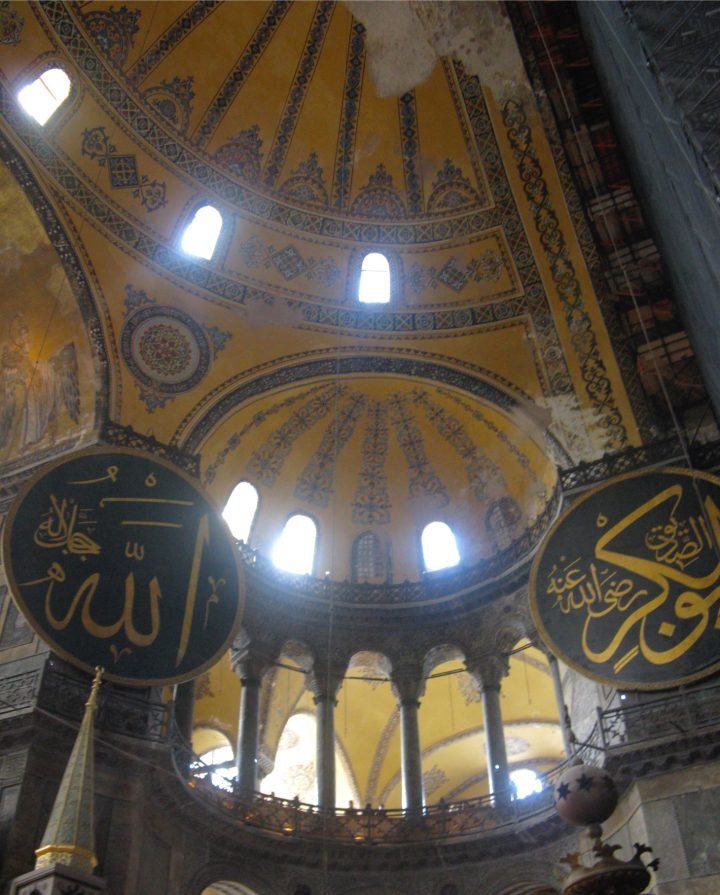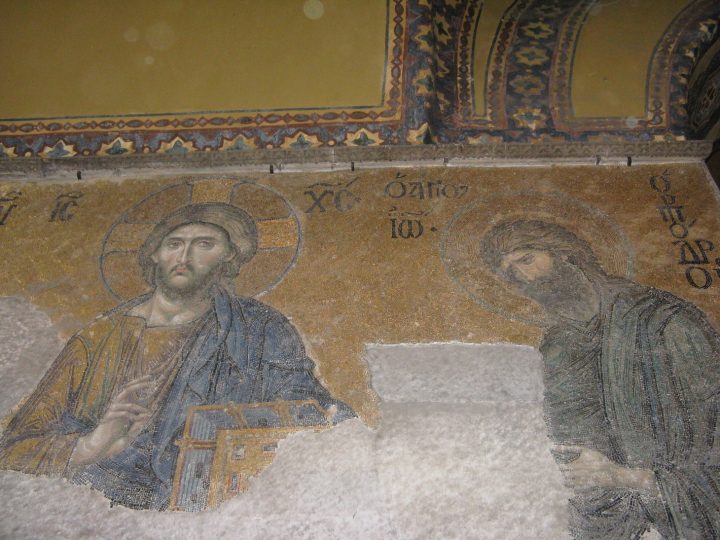
I remember the first time I saw Hagia Sophia. It was almost too much to take in: the towering minarets, the ancient sarcophagi and stone fragments of the even earlier church that stood here in the fifth century (which you pass as you walk along the path toward the entrance). Inside, my eyes passed from huge marble jars, to gold painted ceilings, to mosaics of emperors and saints, to the massive, impossibly high dome. Just the sheer immensity of it all inspired awe.
And yet it didn’t belong to me.
As the Turkish government announced that Istanbul’s Hagia Sophia (Ayasofya in Turkish) will be converted back into a mosque after 85 years as a museum, one of the primary responses worldwide has been to assert that Hagia Sophia is “universal” heritage, that it belongs to all of us. UNESCO issued a statement warning that Turkey’s decision might affect the building’s “universal value.” “Hagia Sophia belongs to the world,” asserted one prominent Byzantine archaeologist in an opinion piece for the Washington Post. Political and religious leaders insisted that Hagia Sophia is part of “our common world heritage,” that it “belongs to all of humanity,” that the Turkish government’s decision is “an open provocation to the civilized world.” But, however impressed we are by Hagia Sophia, here in America or in Europe or wherever else around the world, however much we love the experience of visiting, this building — a church, a mosque, a museum, a cultural touchstone all in one — isn’t ours.

This is undeniably true on a literal level. Hagia Sophia is physically located in Turkey and is regulated by Turkish law. Beyond that, the nation state is a primary element in international heritage law; recognition of national sovereignty is a basic principle. This produces some unresolved tension with the idea, crystallized in UNESCO’s World Heritage List, that at least some heritage has universal value. But this tension is secondary to the issue of ownership. For the purposes of international agreements, heritage (monuments or movable objects) is controlled by the states in whose territory it’s found.
But it’s also true that Hagia Sophia isn’t ours in a moral sense. For decades Hagia Sophia has been a museum and a major tourist attraction. It is an important object of study for scholars around the world. But despite our protests as tourists or scholars or simple lovers of the past, Hagia Sophia is still a part of Istanbul, and it still belongs to the people who live there. Tourists may come and go, but the residents of the city remain with it, day after day.

There’s a real temptation to argue the idea that heritage is universal. But this same universalist argument has been constantly wielded as a powerful weapon by European and American powers for more than 200 years. Why? Though this argument has been used for such a long time, its purpose is typically the same: to claim that things that belong to people in other parts of the world are really ours. From the British and French fighting over the Rosetta Stone to contemporary scholars wanting UNESCO to intervene to “protect” ancient African manuscripts, Europeans and Americans in particular have used claims that heritage belongs to the world to get access to or take control of things belonging to those in less powerful countries. When the Met opened the exhibition Assyria to Iberia in September of 2014, it held a lavish opening ceremony. There, against the backdrop of the picturesque Temple of Dendur, then-Secretary of State John Kerry invoked universalism to insist that the world must stop ISIS’s destruction of cultural heritage. Hours later, the US began its bombing campaign in Syria. Universalist arguments routinely turn out to be justifications for very particular claims for access, for possession, for violence. We must resist this temptation here, even if we find Erdogan’s politics troubling or even outrageous.

We should also be careful not to treat the problem as a religious one. Old buildings are constantly used by people today, throughout the world, for all different functions. While this presents serious challenges for preservation, we should keep in mind that preservation is not the only or even necessarily the highest priority. The use of an ancient building as a mosque is no more damaging than the use of a building as a place of worship for any other religion. Do we really want to argue that the problem is that Hagia Sophia will be used specifically as a mosque? As it is, Turkish authorities have insisted that Hagia Sophia’s mosaics will be preserved, and its portable relics displayed in a museum nearby. But we can already see the potential for the targeting of mosques in revenge.
By emphasizing national sovereignty, however, heritage law encourages a different problem. It reinforces nationalist exploitation of heritage, no matter how cynical or vulgar or damaging to minority populations within a country, or to people of supposed enemy countries beyond the nation’s borders. Hagia Sophia’s past as a church cannot be ignored. It was the world’s largest cathedral for nearly a thousand years and served as the seat of the patriarch of Constantinople. It still holds a central place in the Greek Orthodox world. But beyond this, what of its importance to all the Greeks who used to live (and the relatively few who still do) in Istanbul? Over a million Greeks were forcibly removed from Turkey in 1923 as part of a population transfer with Greece. Many more fled after incidents such as the Istanbul pogrom which targeted the Greek community in 1955 and further deportations in the 1960s. The real problem of converting Hagia Sophia back to a mosque, then, lies in its potential role in Turkish president Recep Tayyip Erdoğan’s sectarian nationalism, and the very real dangers this movement poses to non-Muslims in Turkey. “It is not about us, neither the agendas to convert it to a mosque nor loud reactions against it in Turkey or abroad,” as Christian, Turkish-British think tank fellow Ziya Meral told the Washington Post. But perhaps it should be.
Clearly, we need a way of thinking about heritage that is neither nationalist nor universalist. A way of foregrounding the people who live with these remains of the past every day — along with those who now live in a diaspora, yet still value these monuments and artifacts as an important part of their lives. But this problem is reflected in the very name “heritage.” It focuses on the past — monuments and artifacts as an inheritance — rather than the lives of people today. An inheritance that, we’re led to believe, can’t be left to local groups but must be stewarded by powerful nation states. Maybe the real problem with who owns Hagia Sophia is the concept of heritage itself.
"really" - Google News
July 28, 2020 at 08:02PM
https://ift.tt/304fObm
Who Really Owns Hagia Sophia? - Hyperallergic
"really" - Google News
https://ift.tt/3b3YJ3H
https://ift.tt/35qAk7d
Bagikan Berita Ini














0 Response to "Who Really Owns Hagia Sophia? - Hyperallergic"
Post a Comment